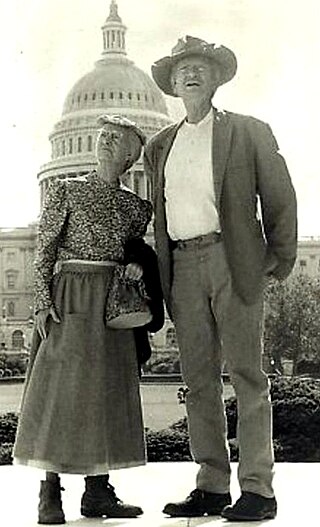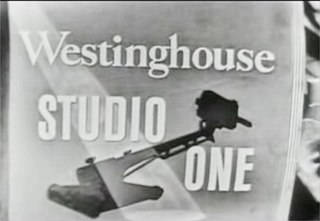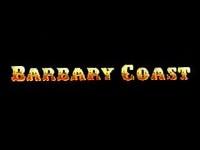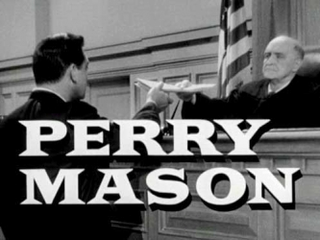Related Research Articles

Candid Camera is an American hidden camera reality television series, with versions of the show appeared on television from 1948 until 2014. Originally created and produced by Allen Funt, it often featured practical jokes, and initially began on radio as The Candid Microphone on June 28, 1947.

Alfred Hitchcock Presents is an American television anthology series created, hosted and produced by Alfred Hitchcock, airing on CBS and NBC, alternately, between 1955 and 1965. It features dramas, thrillers, and mysteries. Between 1962 and 1965 it was renamed The Alfred Hitchcock Hour. Hitchcock himself directed only 18 episodes during its run.

Norman Lewis Corwin was an American writer, screenwriter, producer, essayist and teacher of journalism and writing. His earliest and biggest successes were in the writing and directing of radio drama during the 1930s and 1940s.

The Defenders is an American courtroom drama television series that ran on CBS from 1961 to 1965. It was created by television writer Reginald Rose, and stars E. G. Marshall and Robert Reed as father-and-son defense attorneys Lawrence and Kenneth Preston. Original music for the series was scored by Frank Lewin and Leonard Rosenman. The series was spun off from the Studio One episode The Defender, which starred Ralph Bellamy and William Shatner as the Prestons.

The Twilight Zone is an American fantasy science fiction horror anthology television series created and presented by Rod Serling, which ran for five seasons on CBS from October 2, 1959, to June 19, 1964. Each episode presents a standalone story in which characters find themselves dealing with often disturbing or unusual events, an experience described as entering "the Twilight Zone", often with a surprise ending and a moral. Although often considered predominantly science-fiction, the show's paranormal and Kafkaesque events leaned the show much closer to fantasy and horror. The phrase "twilight zone" has entered the vernacular, used to describe surreal experiences.

The "rural purge" of American television networks was a series of cancellations in the early 1970s of still-popular rural-themed shows with demographically skewed audiences, the majority of which occurred at the end of the 1970–71 television season. In addition to rural-themed shows such as Mayberry R.F.D., The Beverly Hillbillies, Petticoat Junction, and Green Acres, the cancellations ended several highly rated variety shows that had been on CBS since the beginning of television broadcasting. CBS saw a dramatic change in direction with the shift, moving away from shows with rural themes and toward more appeal to urban and suburban audiences.

Howard da Silva was an American actor, director and musical performer on stage, film, television and radio. He was cast in dozens of productions on the New York stage, appeared in more than two dozen television programs, and acted in more than fifty feature films. Adept at both drama and musicals on the stage, he originated the role of Jud Fry in the original 1943 run of the Rodgers and Hammerstein musical Oklahoma!, and also portrayed the prosecuting attorney in the 1957 stage production of Compulsion. Da Silva was nominated for a 1960 Tony Award as Best Featured Actor in a Musical for his work in Fiorello!, a musical about New York City mayor LaGuardia. In 1961, da Silva directed Purlie Victorious, by Ossie Davis.

Studio One is an American anthology drama television series that was adapted from a radio series. It was created in 1947 by Canadian director Fletcher Markle, who came to CBS from the CBC. It premiered on November 7, 1948, and ended on September 29, 1958, with a total of 467 episodes over the course of 10 seasons.

Barbary Coast is an American television series that aired on ABC. The pilot film first aired on May 4, 1975, and the series itself premiered September 8, 1975; the last episode aired January 9, 1976.

Perry Mason is an American legal drama series originally broadcast on CBS television from September 21, 1957, to May 22, 1966. The title character, portrayed by Raymond Burr, is a Los Angeles criminal defense lawyer who originally appeared in detective fiction by Erle Stanley Gardner. Many episodes are based on stories written by Gardner.
The Andersonville Trial is a 1959 hit Broadway play by Saul Levitt. It was later adapted into a television production and presented as part of the PBS anthology series Hollywood Television Theatre.
Goodyear Television Playhouse is an American anthology series that was telecast live on NBC from 1951 to 1957 during the first Golden Age of Television.
Star Trek is an American science fiction media franchise created by Gene Roddenberry, which began with the eponymous 1960s television series and became a worldwide pop-culture phenomenon. Since its creation, the franchise has expanded into various films, television series, video games, novels, and comic books, and it has become one of the most recognizable and highest-grossing media franchises of all time.

William Shatner is a Canadian actor. In a career spanning seven decades, he is best known for his portrayal of James T. Kirk in the Star Trek franchise, from his 1966 debut as the captain of the starship Enterprise in the second pilot of the first Star Trek television series to his final appearance as Captain Kirk in the seventh Star Trek feature film, Star Trek Generations (1994).
Seymour "Buzz" Kulik was an American film director and producer. He directed 72 films and television shows, including the landmark CBS television network anthology series Playhouse 90 and several episodes of The Twilight Zone. Kulik went on to direct made-for-TV movies, such as Brian's Song
James Thomas Aubrey Jr. was an American television and film executive. As president of the CBS television network from 1959 to 1965, with his "smell for the blue-collar," he produced some of television's most enduring series on the air, including Gilligan's Island and The Beverly Hillbillies.

Mind Meld: Secrets Behind the Voyage of a Lifetime is a 2001 American documentary film in which actors William Shatner and Leonard Nimoy discuss the Star Trek science fiction franchise and its effects on their lives. Shatner and Nimoy portrayed the characters James T. Kirk and Spock respectively in the 1960s Star Trek television series, the 1970s animated television series, and their film sequels.
Herbert Brodkin was an American producer and director of film and television.

"The Defender" is an American television play broadcast live in two parts on February 25, 1957, and March 4, 1957, as part of the CBS television series, Studio One. A courtroom drama, it was written by Reginald Rose and directed by Robert Mulligan. The cast included Ralph Bellamy and William Shatner as a father-son defense team, Steve McQueen as the defendant, and Martin Balsam as the prosecutor. Rose later spun off the concept into a full series entitled The Defenders, starring E.G. Marshall and Robert Reed in Bellamy and Shatner's roles.
References
- 1 2 McNeil, Alex (1996). Total Television: the Comprehensive Guide to Programming from 1948 to the Present (4th ed.). New York, New York: Penguin Books USA, Inc. p. 296. ISBN 0-14-02-4916-8.
- ↑ Shatner, William; Culbreath, Myrna; Marshak, Sandra (1979). Shatner : Where No Man; The Authorized Biography of William Shatner . New York, NY: Grosset & Dunlap. p. 73. ISBN 0-441-88975-1. "But there were the stresses of his career — once the strain of filming his series "For The People" in New York, coming home when he could, while the children were in school in Los Angeles."
- 1 2 3 4 5 "'For the People' To Premiere". The Shreveport Journal. January 29, 1965. p. D 5. Retrieved July 1, 2023– via Newspapers.com.
- ↑ TV Guide. "For the People Cast and Details". TV Guide. Retrieved 2013-01-22.
- 1 2 3 4 5 6 7 Brooks, Tim; Marsh, Earle (1999). The Complete Directory to Prime Time Network and Cable TV Shows 1946-Present (7th ed.). New York: The Ballentine Publishing Group. p. 358. ISBN 0-345-42923-0.
- ↑ Newton, Dwight (February 12, 1965). "Short Notes and Quotes". San Francisco Examiner. p. 39. Retrieved April 29, 2021.
- ↑ "Tops on Television". The Jackson Sun. March 7, 1965. p. 17-A. Retrieved July 1, 2023.
- 1 2 Adams, Val (March 26, 1965). "C.B.S. Will Drop 'For the People': Reruns of 'Twilight Zone' to Replace Sunday" . The New York Times. p. 71. Retrieved June 29, 2023.
- ↑ Gardner, Paul (October 12, 1964). "C.B.S. Preparing Stand-By Series: Replacement for Show to Be Ready in January" . The New York Times. p. 59. Retrieved June 29, 2023.
- 1 2 3 4 Erickson, Hal (October 21, 2009). Encyclopedia of Television Law Shows: Factual and Fictional Series About Judges, Lawyers and the Courtroom, 1948-2008. McFarland. pp. 108–109. ISBN 978-0-7864-5452-5 . Retrieved June 30, 2023.